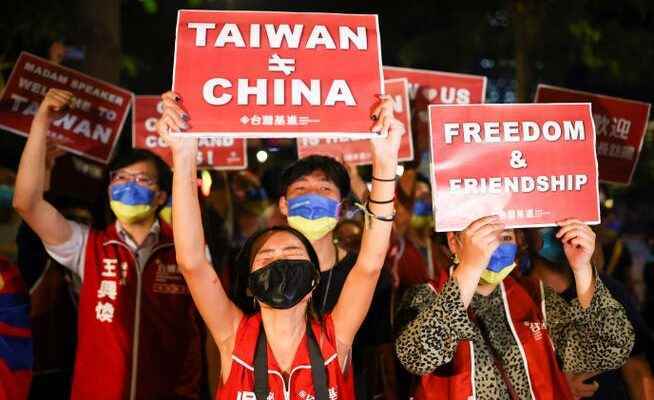Even before the American politician arrived in Taiwan, China’s People’s Liberation Army had launched several fighter planes. The military retaliatory measures will escalate further in the coming days.
Demonstrators in Taipei welcome Pelosi’s visit to Taiwan.
At 10:43 p.m., the American Air Force Boeing landed in Taipei, probably the most anticipated flight in years. Minutes after Nancy Pelosi, Speaker of the US House of Representatives, was welcomed on the runway by Taiwan’s Secretary of State Joseph Wu, she tweeted her message to the world: “America’s solidarity with the 23 million residents of Taiwan is more important today than it is today Ever since the world faces a choice between autocracy and democracy».
America’s solidarity with the 23 million people of Taiwan is more important today than ever, as the world faces a choice between autocracy and democracy.
— Nancy Pelosi (@SpeakerPelosi) August 2, 2022
The harsh reaction of the Beijing Ministry of Foreign Affairs followed promptly. Pelosi’s visit to Taiwan is a “major political provocation” that will never be accepted. “Whoever plays with fire will perish,” the statement said. And as if to prove it, the People’s Liberation Army not only dispatched several warplanes across the Taiwan Straits, but also announced several military drills with live ammunition through Sunday.
Experts on the other side of the Atlantic also expect that Xi Jinping could speak a clear word of power. After all, just a few months before the important 20th party congress in Beijing, the 69-year-old faces the biggest challenge of his political career. The domestic growth engine has flagged due to the regular Covid lockdowns, the real estate crisis is getting worse and youth unemployment is at an all-time high.
Is the crisis getting worse?
Quite a few experts see the danger that Xi could currently be particularly willing to whitewash domestic problems with the help of an external scapegoat.
“I’m not saying that Pelosi’s visit will trigger a war,” commented John Culver, now a retired CIA analyst from Washington. But: According to his assessment, a crisis of the magnitude that last occurred in the mid-1990s is “at the optimistic end of the possible spectrum”. At the time, the US deployed two aircraft carrier strike groups in the waters around the island, while China conducted several missile tests. This time, the conflict could possibly escalate even more violently.
In Xiamen, southeast China, countless howitzers and other military equipment were demonstratively rolling through the city on Tuesday morning. In a video that has been shared particularly often on the online platform Weibo, you can see how several tanks drive along a busy beach in a way that attracts public attention.
In addition to the military measures, China’s economic retaliation has already begun: On Tuesday, the Chinese customs authorities summarily blocked 100 food exporters from Taiwan, and suspected Chinese hackers also temporarily paralyzed the websites of Taiwan’s foreign ministry and president’s office.
Serenity in Taiwan
So far, however, the residents there have not been impressed by the geopolitical crisis. On the offshore island of Kinmen, from whose coast you can already see the Chinese mainland with the naked eye, the tourists enjoyed their sightseeing between museums and temples as if nothing had happened. But on closer inspection, it is only logical that people in Taiwan are particularly deaf to the Chinese threat, after all it has been a constant companion of everyday life for decades.
“The United States should not be threatened by a dictatorship,” said Fang Chen-Yu, a professor at Taipei’s Soochow University. According to the political scientist, the potential risk posed by Pelosi’s visit is “low”. Because China’s military is not yet strong enough to take over the island state.
But of course the question arises as to what exactly Nancy Pelosi wants to achieve with her primarily symbolic trip to Taiwan. She will not be able to offer President Tsai Ing-Wen more than rhetorical support, and the 82-year-old does not have the power to make substantial concessions. Pelosi is at least partly on a “personally motivated mission”: She has been a staunch critic of the Communist Party for decades, and in 1991 she visited Beijing’s Tiananmen Square to hoist a poster in honor of the demonstrators who died there.
The danger, on the other hand, is that the democrat will offer the hardliners in Beijing an excuse to escalate the conflict over the democratically governed island state militarily.
On China’s leading online platform “Weibo”, leading political commentators have been fueling a possible invasion for days. Blogger Zhan Hao writes to his almost four and a half million followers: “China needs a good opportunity to unite Taiwan. A good opportunity is when China’s People’s Liberation Army is forced into action – and the blame for the military unification can be placed solely on the US and Taiwan governments.”
How tense the situation is was also evident on Tuesday night in the Chinese capital: in Beijing’s embassy district, the security police literally surrounded the American embassy, and more than a hundred buses, police cars and motorcycles were parked around the area.
